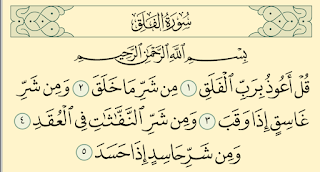The Noble Quran English Translation and Tafsir of Surah Al-Mulk 1-5
67:1 Blessed is He in Whose hand is the dominion and He is powerful over all things,
67:2 Who created death and life that He may test you which of you is best in conduct, and He is the All-Mighty, the All-Forgiving,
67:3 Who created seven heavens one upon another. You see not in the creation of the All-Merciful any inconsistency. Then look again, do you see any fissure?
67:4 Then look again and yet again, your gaze will come back to you humbled, weary.
67:5 And verily We have adorned the lower heaven with lamps and made therefrom shooting stones for the devils. And We have prepared for them the torment of the Blaze.
Tafsir
67:1 Blessed is He in Whose hand is the dominion and He is powerful over all things,
In the Arabic language, ‘tabark, translated into blessed is derived from al-al-barkah, namely, abundant blessings, or being firm and lasting.
Allah exalts and glorifies Himself with His great attributes to teach His slaves how they should exalt and glorify Him.
Allah is the only Disposer of all creatures’ affairs. His ability is perfect and nothing can stand before Him. He governs the affairs of His kingdom, as He wants. He raises the rank of whom He wants, He humiliates whom He wants, He gives whom He wants, and He withholds His blessings from whom He wants. Allah is not asked why He does something or why He does not do something. He does what He wants according to His perfect justice and wisdom. Allah has perfect attributes and names.
In sum, the ayah confirms that Allah is high above all creatures, that He is the only owner and king of all creatures, that He governs and manages the affairs of the heavens, the earth, and all that are in them, and that He has perfect ability and authority over all things.
67:2 Who created death and life that He may test you which of you is best in conduct, and He is the All-Mighty, the All-Forgiving,
The ayah mentions an aspect of Allah’s perfect knowledge and ability.
Allah created death and life. He causes whom He wants to die and He causes whom He wants to live. Allah created people to test them as to whom of them will do the best conduct in the life of this world. Then, He will recompense every doer according to his deeds, good or evil.
Allah is the All-Mighty and no one can overcome Him and nothing can stand before Him. Allah is the All-Forgiving. He forgives the sins of those who repent of their sins and seek His forgiveness.
Death is first mentioned because it implies subjugation since no one can escape from death. It is also said that death is mentioned first because things have no presence before their existence and that mentioning death first motivates one to do his best to please Allah, obey His commands, and avoid His prohibitions.
Qatada, may Allah be pleased with him, said about the meaning of the following ayah: [67:2 Who created death and life…] ‘Allah humiliates man by death. He has made the life of this world the home of life and the Hereafter the home of recompense and perpetuity.’
Some scholars say that death is not complete nonexistence; rather, it is a state of disconnection and separation of the soul from the body. Death is a transformation from one state to another one and moving from one place to another place, and life is the opposite of it.
67:3 Who created seven heavens one upon another. You see not in the creation of the All-Merciful any inconsistency. Then look again, do you see any fissure?
67:4 Then look again and yet again, your gaze will come back to you humbled, weary.
Allah, Exalted be He, created seven heavens one upon another in the best form. You, the beholder, do not see any inconsistency in the creation of Allah, the All-Merciful.
Look again at heaven, do you see any fissure in it? No, Allah created heaven in the best form and there is no fissure therein, which proves that its Creator is great and able.
Then, look again at heaven, and look again. Every time you, the beholder, look at heaven, your gaze will come back to you humbled and weary as it will find no fault or defect in the creation of heaven.
O beholder, you will see no inconsistency, fault, or defect in heaven no matter how many times you will look at it.
67:5 And verily We have adorned the lower heaven with lamps and made therefrom shooting stones for the devils. And We have prepared for them the torment of the Blaze.
Allah, Exalted be He, has adorned the lower heaven with stars so it becomes in the best form. The stars are called lamps because they illuminate heaven like lamps. Moreover, Allah, the Able, has made the stars shooting stones when meteors fall on and burn the devils, which is their punishment in the life of this world. And Allah has prepared for the devils severe torment in the blazing fire of Hell on the Day of Judgment.
Qatada, may Allah have mercy on him, said, ‘[67:5 And verily We have adorned the lower heaven with lamps and made therefrom shooting stones for the devils.] Allah, Exalted be He, has created the stars for three functions, namely, to adorn the lower heaven, as shooting stones for the devils, and signs that guide people on earth. Then, whoever claims that they have other functions, he has said groundless opinion, erred, missed his share, and claimed to have knowledge that he does have.’
Learned Lessons from Surah Al-Mulk Ayah 1-5
• Allah is great in His self, names, and attributes. He is the Owner and King of heaven, the earth, and all that are in them, and He is able to do all things.
• Allah created death and life to test people as to who will obey His commands and who will disobey Him in the life of this world. On the Day of Judgment, He will recompense every person according to his deeds, good or evil.
• Allah is the All-Mighty and the All-Forgiving. He will punish the evildoers and forgive those who repent of their sins and reward them immensely.
• Allah has created seven heavens in the best form and adorned the lower heaven with stars. There is no inconsistency in the creation of the heavens, which confirms that their Creator, Allah, is One and Able.
• No matter how many times the beholder looks at heaven, he will never find any defect or fault in its creation.
• Allah has made the stars shooting stones that fall and burn the devils when meteors on them in the life of this world, and He has prepared for them severe punishment in the blazing fire of Hell on the Day of Judgment.
• Allah’s knowledge and power are perfect.
The Noble Quran English Translation of Surah Al-Mulk
Tafsir Ibn Kathir English Translation of Tafsir Surah Al-Mulk
Introduction to English Translation and Tafsir of Surah Al-Mulk
The Noble Quran Surah an-Nahl English Translation and Tafsir




